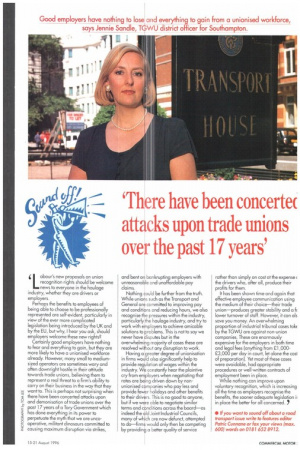'There have been concerta attacks upon trade unions
Page 51

If you've noticed an error in this article please click here to report it so we can fix it.
over the past 17 years'
4 abour's new proposals on union
L
recognition rights should be welcome news to everyone in the haulage industry, whether they are drivers or employers.
Perhaps the benefits to employees of being able to choose to be professionally represented are self-evident, particularly in view of the ever more complicated legislation being introduced by the UK and by the EU, but why, I hear you ask, should employers welcome these new rights? Certainly good employers have nothing to fear and everything to gain, but they are more likely to have a unionised workforce already. However, many small to mediumsized operators are sometimes wary and often downright hostile in their attitude towards trade unions, believing them to represent a real threat to a firm's ability to carry on their business in the way that they Lt; want to. This is perhaps not surprising when i there have been concerted attacks upon
)2 and demonisation of trade unions over the past 17 years of a Tory Government which
khas done everything in its power to
si perpetuate the myth that we are uncooperative, militant dinosaurs committed to
i causing maximum disruption via strikes, and bent on bankrupting employers with unreasonable and unaffordable pay claims Nothing could be further from the truth. While unions such as the Transport and General are committed to improving pay and conditions and reducing hours, we also recognise the pressures within the industry, particularly the haulage industry, and try to work with employers to achieve amicable solutions to problems. This is not to say we never have disputes but in the overwhelming majority of cases these are resolved without any disruption to work. Having a greater degree of unionisation in firms would also significantly help to provide regulation of wages within the industry. We constantly hear the plaintive cry from employers when negotiating that rates are being driven down by nonunionised companies who pay less and provide fewer holidays and other benefits to their drivers This is no good to anyone, but if we were able to negotiate similar terms and conditions across the board—as indeed the old Joint Industrial Councils, many of which ore now defunct, attempted to do—firms would only then be competing by providing a better quality of service rather than simply on cost at the expense the drivers who, after all, produce their profits for them. It has been shown time and again that effective employee communication using the medium of their choice—their trade union—produces greater stability and a fe lower turnover of staff. However, it can als save you money. An overwhelming proportion of industrial tribunal cases take by the TGWU are against non-union companies. These are enormously expensive for the employers In both time and legal fees (anything from £1,00023,000 per day in court, let alone the cosi of preparation). Yet most of these cases were avoidable, had appropriate procedures or well-written contracts of employment been in place.
While nothing can improve upon voluntary recognition, which is increasing all the time as employers recognise the benefits, the sooner adequate legislation i! in place the better for all concerned.












































































































